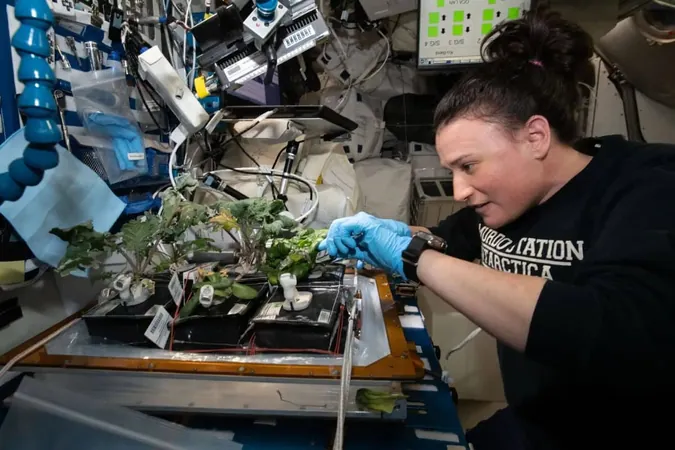
NASA’s Ambitious Vision: Growing Plants on Mars and Beyond!
2025-01-23
Author: Jia
In the realm of space exploration, one of the most extraordinary challenges is ensuring the health and sustainability of astronauts on long-term missions. NASA is at the forefront of this endeavor, pioneering innovative techniques to grow nutritious plants in space. This effort not only aims to solve food shortages during future missions to Mars but also holds the potential for significant breakthroughs in agriculture back here on Earth.
The Journey of Dr. Gioia Massa: From Dreamer to Pioneer
Dr. Gioia Massa’s passion for space and biology ignited at just 12 years old, sparked by a visit to NASA’s Kennedy Space Center. That pivotal experience propelled her on a journey through academia and beyond, where she pursued a doctorate in plant biology and ultimately a postdoctoral fellowship at NASA. Under the guidance of Dr. Raymond Wheeler, she laid essential groundwork for the future of space agriculture, enabling astronauts to cultivate and consume fresh crops aboard the International Space Station (ISS).
As a leading project scientist, Dr. Massa spearheaded the creation of Veggie, a compact plant growth chamber designed for microgravity environments. Since its first use in 2014, Veggie has revolutionized space agriculture by demonstrating the feasibility of growing various crops, including lettuce, mustard greens, kale, and even flowers, aboard the ISS.
Innovative Farming with Veggie: Harvesting Hope in Space
The Veggie system is ingeniously designed, mimicking the size of a carry-on suitcase while utilizing LED lighting and specially developed plant "pillows" comprised of clay-based growth mediums. This innovative approach allows astronauts to grow fresh produce, which not only satisfies nutritional needs but also alleviates menu fatigue and boosts morale—two crucial factors during long missions away from home.
Research has shown that incorporating blue light can bring about enhanced health benefits in the plants, prompting the production of beneficial secondary metabolites. By controlling environmental factors, scientists can mitigate the risks associated with harmful pathogens, ensuring the safety of crops cultivated in space.
The Next Step: Advanced Plant Habitat Research
Building on Veggie’s success, NASA is advancing its research with the Advanced Plant Habitat (APH). This sophisticated system features over 180 sensors and automated controls, enabling astronomers to monitor plant growth with unmatched precision. Dr. Massa’s current project, Plant Habitat-07, focuses on how varying moisture levels affect the health and microbiomes of crops like red romaine lettuce.
These findings have implications that extend far beyond the cosmos. By understanding how plants react to environmental stressors such as drought or flooding, researchers are working to create more resilient agricultural systems that can withstand the rigors of climate change on Earth.
Unlocking the Mysteries of Plant Biology in Space
Microgravity presents unique challenges for plant growth. Factors like elevated CO2 levels and limited resources drastically affect how plants develop. Researchers are employing model organisms, particularly Arabidopsis thaliana, to gain insights into the genetic and metabolic changes that occur in space. This research paves the way for bioengineering crops that can thrive during long-term missions.
An interesting discovery from these experiments involved an immune response challenge noted during studies with zinnias. A fungal outbreak highlighted potential vulnerabilities in the plants grown in microgravity, emphasizing the need to address these issues to ensure reliable food sources for astronauts on extended missions.
A Sustainable Future for Earth and Space
The insights gained from NASA’s space agriculture initiatives extend well beyond the final frontier. Techniques developed for growing crops in challenging microgravity conditions are being adapted for use in Earth’s agricultural systems, offering hope for increased resilience in regions facing extreme weather.
Moreover, the principles of the Veggie and APH systems could inspire urban farming innovations, allowing for efficient resource use while optimizing yield—a vision that grows increasingly vital as the global population expands and climate change impacts food security.
NASA’s commitment to space agriculture is not only about feeding astronauts on Mars; it’s about crafting a sustainable and promising future for humanity. Dr. Massa's inspiring journey from a young space enthusiast to a pioneering researcher encapsulates the spirit of innovation that drives both space exploration and improvements in agricultural practices on Earth.
Stay tuned, as NASA's ongoing experiments might just change the way we perceive farming—both in space and on our home planet!


 Brasil (PT)
Brasil (PT)
 Canada (EN)
Canada (EN)
 Chile (ES)
Chile (ES)
 Česko (CS)
Česko (CS)
 대한민국 (KO)
대한민국 (KO)
 España (ES)
España (ES)
 France (FR)
France (FR)
 Hong Kong (EN)
Hong Kong (EN)
 Italia (IT)
Italia (IT)
 日本 (JA)
日本 (JA)
 Magyarország (HU)
Magyarország (HU)
 Norge (NO)
Norge (NO)
 Polska (PL)
Polska (PL)
 Schweiz (DE)
Schweiz (DE)
 Singapore (EN)
Singapore (EN)
 Sverige (SV)
Sverige (SV)
 Suomi (FI)
Suomi (FI)
 Türkiye (TR)
Türkiye (TR)
 الإمارات العربية المتحدة (AR)
الإمارات العربية المتحدة (AR)